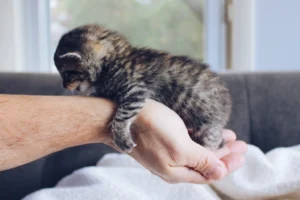Have you ever wondered why baby cats hiss? It’s a common behavior that can leave many pet owners puzzled. Let’s explore the reasons behind this adorable yet sometimes alarming trait in kittens.
Baby Cat Hissing: Understanding the Behavior
Instinctual Behavior: Why do baby cats hiss in the first place?
When you see a tiny kitten hissing, you might wonder what’s up with that little ball of fluff. Well, it turns out that hissing is actually a totally normal behavior for baby cats. Hissing is an instinctual response that stems from their wild ancestors. In the wild, cats hiss to warn potential threats to back off or to establish dominance within their territory. So, when your little furball hisses, they’re just tapping into their inner wildcat!
Communication Signals: What are baby cats trying to communicate through hissing?
Picture this: your precious kitten encounters something new or intimidating, and suddenly, hiss! What’s that all about? When kittens hiss, they’re not trying to be aggressive just for the fun of it. Instead, they’re communicating their discomfort, fear, or even a simple boundary. It’s their way of saying, “I’m not comfortable with this situation, so back off, buddy!” So, if your baby cat lets out a hiss, take a step back and give them some space to calm down.
Additional Insight:
Apart from fear or aggression, kittens may also hiss to warn their littermates when playtime gets a bit too rough. It’s their way of setting boundaries and saying, “Hey, that’s enough roughhousing for now!”
Remember, when your baby cat hisses, it’s not about being mean—it’s simply a part of their natural communication repertoire.
When baby cats hiss, it’s not just about being grumpy – it’s actually a vital part of their socialization process. Hissing is a kitten’s way of setting boundaries and communicating with their littermates, other animals, and even humans. It helps them establish their place in the social hierarchy and learn how to interact with others in a respectful manner.
Understanding the importance of hissing in a kitten’s social interactions is key to helping them develop into well-adjusted adult cats. By allowing kittens to hiss when they feel threatened or uncomfortable, we are teaching them valuable communication skills that will serve them throughout their lives. So, next time your baby cat hisses, try to see it as a learning opportunity rather than just a sign of aggression.
Remember, hissing is a normal behavior for kittens, and with patience and understanding, you can help them navigate their social world confidently and respectfully.
Handling Hissing: How should pet owners respond to a baby cat’s hissing?
When your baby cat starts hissing, it can be tempting to scold or reprimand them, but that’s not the best approach. Instead, try to understand why they are hissing and address the underlying cause. Maybe they feel threatened by a new environment, a loud noise, or an unfamiliar person. By identifying the trigger, you can help your kitten feel more secure and less inclined to hiss.
One effective strategy for handling a hissing kitten is to gradually socialize them to new experiences, people, and animals. Start with slow introductions, positive reinforcement, and plenty of patience. Building trust with your kitten is crucial in teaching them that there’s no need to hiss when they feel scared or anxious.
Remember, responding to hissing with understanding and compassion will help your kitten develop into a confident and well-rounded cat who knows how to communicate effectively without resorting to aggression.
Tips for handling a hissing kitten: 1. Stay calm and avoid reacting with fear or anger. 2. Give your kitten space and time to calm down. 3. Use positive reinforcement to reward good behavior. 4. Seek advice from a professional behaviorist if needed.
For more in-depth guidance on kitten behavior and socialization, check out this resource from the American Society for the Prevention of Cruelty to Animals: Kitten Socialization Guide
Developmental Milestones: At what age do kittens typically stop hissing?
Kittens usually start hissing around 7 to 14 days old. This behavior is a natural defense mechanism they use when feeling scared or threatened. As kittens grow and develop, they typically stop hissing around 8 to 12 weeks old. At this age, they become more confident and comfortable in their surroundings, leading to a decrease in hissing behavior. It’s important to provide a safe and nurturing environment for young kittens to help them feel secure and reduce the need to hiss.
Environmental Factors: What environmental factors may trigger a baby cat to hiss?
- Loud noises: Sudden loud noises can startle kittens, causing them to hiss in response.
- Unfamiliar people or animals: Meeting new faces or interacting with other pets can lead to feelings of uncertainty in kittens, prompting them to hiss.
- Stressful situations: Changes in the environment, such as moving to a new home or changes in routine, can make kittens feel anxious and more likely to hiss.
- Lack of socialization: Kittens that have not been properly socialized may hiss more frequently as they are not accustomed to different situations and people.
It’s essential to create a calm and predictable environment for baby cats to help reduce their stress levels and minimize hissing behavior. Consider providing safe spaces for them to retreat to when feeling overwhelmed and gradually introducing them to new experiences to build their confidence.
For more information on kitten behavior and training, check out this resource: The Humane Society – Kitten Behavior and Training
Behavioral Training: Can hissing behavior be modified or corrected in kittens?
Understanding that hissing is a natural instinct in cats, it is possible to modify this behavior in kittens through consistent and patient training. Positive reinforcement techniques such as rewarding desirable behaviors like calm interaction with treats or toys can help discourage hissing. Additionally, socialization plays a crucial role in shaping a kitten’s behavior – exposing them to various people, animals, and environments can help reduce fear-based reactions like hissing.
Seeking Professional Help: When should pet owners seek advice from a veterinarian or animal behaviorist?
While occasional hissing in kittens is normal, persistent or aggressive hissing may indicate an underlying issue that requires professional intervention. If a kitten’s hissing is accompanied by other concerning behavior such as aggression, fear, or avoidance, it is advisable to seek advice from a veterinarian or an animal behaviorist. These experts can assess the situation, provide a diagnosis, and offer tailored solutions to address the behavior effectively.
Fun Facts about Hissing in Baby Cats
Hissing as Communication : While hissing is often associated with fear or aggression, baby cats may also hiss as a form of communication. They use this sound to establish boundaries or express discomfort in certain situations.
Mimicking Adults : Kittens may learn to hiss by observing adult cats in their environment. They mimic this behavior as a way to protect themselves or assert dominance in interactions with humans or other animals.
Temporary Phase : Hissing behavior in baby cats is commonly a temporary phase as they learn to navigate their surroundings and establish their comfort levels. With proper training and socialization, most kittens outgrow this behavior as they mature and become more confident in their environment.
Alex, a passionate animal lover, has experience in training and understanding animal behavior. As a proud pet parent to two dogs and three cats, he founded AnimalReport.net to share insights from animal experts and expand his knowledge of the animal kingdom.




